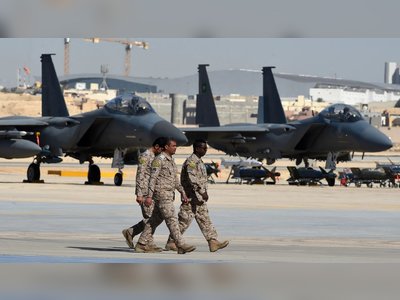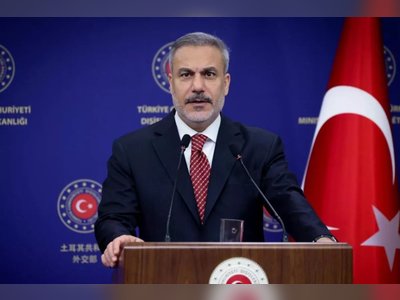
Gaza Faces Worsening Malnutrition Crisis Amid Continuing Israeli Offensive
Israeli blockade enters fourth week as toll surpasses 50,000 fatalities since conflict escalation began.
The humanitarian situation in Gaza continues to deteriorate, with reports from medical and aid workers indicating a rising malnutrition crisis as the total Israeli blockade of essential supplies stretches into its fourth week.
Experts are warning of increasing malnutrition among the population, notably affecting children who are vital for the region's future.
The escalation of military operations began with extensive airstrikes by Israel that commenced last Tuesday, resulting in approximately 400 fatalities, primarily civilians.
Palestinian officials disclosed that the total death toll from the conflict, which reignited after an attack by Hamas militants in October 2023, has now surpassed 50,000, with about 113,000 people reported injured.
In a recent airstrike on Khan Younis, Israel struck at a member of Hamas’s political leadership, Salah Bardawil, prompting the Israeli Defense Forces (IDF) to issue new evacuation orders to residents in areas around Rafah.
These orders explicitly prohibited civilian vehicle access, amidst numerous civilian casualties from attacks on cars.
IDF's statements warned the public to distance themselves from combat zones.
As of recent reports, at least 19 Palestinians were killed in a single night of bombing.
Two hospitals in southern Gaza have reported receiving multiple casualties, including women and children.
Israel has positioned troops to encircle the Tal al-Sultan refugee camp, emphasizing that its military objectives include dismantling terrorist infrastructure within Gaza.
Israel's ongoing military campaign follows significant violence which has claimed a substantial number of lives since the renewed conflict initiated.
Contrary to expectations, Israel has not signaled any intention to permit aid entry to Gaza.
Following accusations from Israel that Hamas has been hoarding aid supplies, officials from the humanitarian sector have warned of a looming food crisis with severe ramifications for the civilian population.
Aid distributions are becoming increasingly difficult, with significant shortages of essential items like cooking gas and flour.
Prices for the limited available food have surged, making it inaccessible for the majority of the population.
Reports indicate that 6 out of 23 bakeries operating in Gaza have shut down due to an inability to secure cooking gas.
The main UN agency providing humanitarian assistance in the region, UNRWA, has found its stock of flour dwindling to a critically low level.
Medical professionals have highlighted noticeable weight loss among patients linked to prolonged poor nutrition, with urgent calls for food aid continuing.
The adverse effects of continued military action have exacerbated existing medical challenges, with hospitals facing overwhelming numbers of injured individuals and a lack of medical supplies.
On the ground, Palestinians are enduring severe displacement and loss of homes, with many fleeing multiple times amid ongoing clashes.
The local health system is nearing collapse under the strain of the conflict, further complicating aid distribution in an environment wrought with danger.
The IDF's military objectives include engaging known Hamas operatives and dismantling their operational capabilities.
Critics within Israel argue whether these measures will sufficiently address national security concerns or if they may escalate the humanitarian crisis.
In parallel, domestic tension within Israel has escalated, triggered by protests against the government’s military strategies and leadership decisions, amplifying calls for prioritizing the return of hostages over continued aggressive military operations.
As Israeli officials discuss long-term strategies involving territorial control and potential resettlement of Palestinian populations, legal experts have raised concerns regarding compliance with international law amid proposals resembling prior contentious regional plans.
The widespread turmoil underscores the urgency for a resolution to the ongoing humanitarian crisis impacting millions in Gaza.
Experts are warning of increasing malnutrition among the population, notably affecting children who are vital for the region's future.
The escalation of military operations began with extensive airstrikes by Israel that commenced last Tuesday, resulting in approximately 400 fatalities, primarily civilians.
Palestinian officials disclosed that the total death toll from the conflict, which reignited after an attack by Hamas militants in October 2023, has now surpassed 50,000, with about 113,000 people reported injured.
In a recent airstrike on Khan Younis, Israel struck at a member of Hamas’s political leadership, Salah Bardawil, prompting the Israeli Defense Forces (IDF) to issue new evacuation orders to residents in areas around Rafah.
These orders explicitly prohibited civilian vehicle access, amidst numerous civilian casualties from attacks on cars.
IDF's statements warned the public to distance themselves from combat zones.
As of recent reports, at least 19 Palestinians were killed in a single night of bombing.
Two hospitals in southern Gaza have reported receiving multiple casualties, including women and children.
Israel has positioned troops to encircle the Tal al-Sultan refugee camp, emphasizing that its military objectives include dismantling terrorist infrastructure within Gaza.
Israel's ongoing military campaign follows significant violence which has claimed a substantial number of lives since the renewed conflict initiated.
Contrary to expectations, Israel has not signaled any intention to permit aid entry to Gaza.
Following accusations from Israel that Hamas has been hoarding aid supplies, officials from the humanitarian sector have warned of a looming food crisis with severe ramifications for the civilian population.
Aid distributions are becoming increasingly difficult, with significant shortages of essential items like cooking gas and flour.
Prices for the limited available food have surged, making it inaccessible for the majority of the population.
Reports indicate that 6 out of 23 bakeries operating in Gaza have shut down due to an inability to secure cooking gas.
The main UN agency providing humanitarian assistance in the region, UNRWA, has found its stock of flour dwindling to a critically low level.
Medical professionals have highlighted noticeable weight loss among patients linked to prolonged poor nutrition, with urgent calls for food aid continuing.
The adverse effects of continued military action have exacerbated existing medical challenges, with hospitals facing overwhelming numbers of injured individuals and a lack of medical supplies.
On the ground, Palestinians are enduring severe displacement and loss of homes, with many fleeing multiple times amid ongoing clashes.
The local health system is nearing collapse under the strain of the conflict, further complicating aid distribution in an environment wrought with danger.
The IDF's military objectives include engaging known Hamas operatives and dismantling their operational capabilities.
Critics within Israel argue whether these measures will sufficiently address national security concerns or if they may escalate the humanitarian crisis.
In parallel, domestic tension within Israel has escalated, triggered by protests against the government’s military strategies and leadership decisions, amplifying calls for prioritizing the return of hostages over continued aggressive military operations.
As Israeli officials discuss long-term strategies involving territorial control and potential resettlement of Palestinian populations, legal experts have raised concerns regarding compliance with international law amid proposals resembling prior contentious regional plans.
The widespread turmoil underscores the urgency for a resolution to the ongoing humanitarian crisis impacting millions in Gaza.











